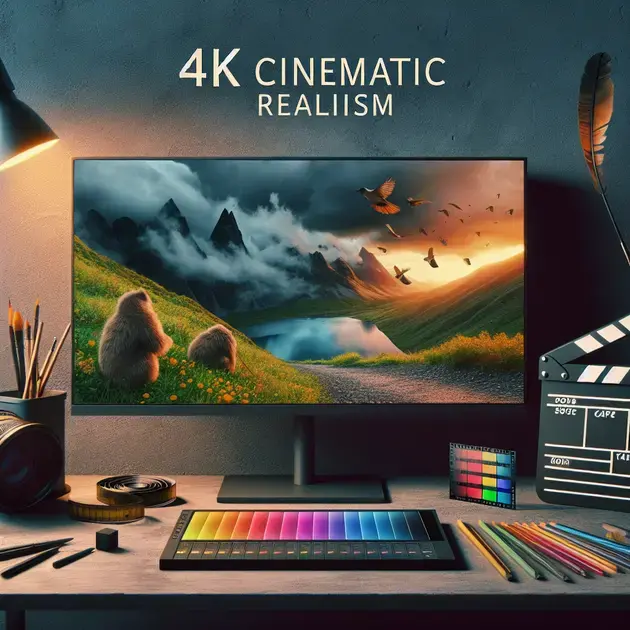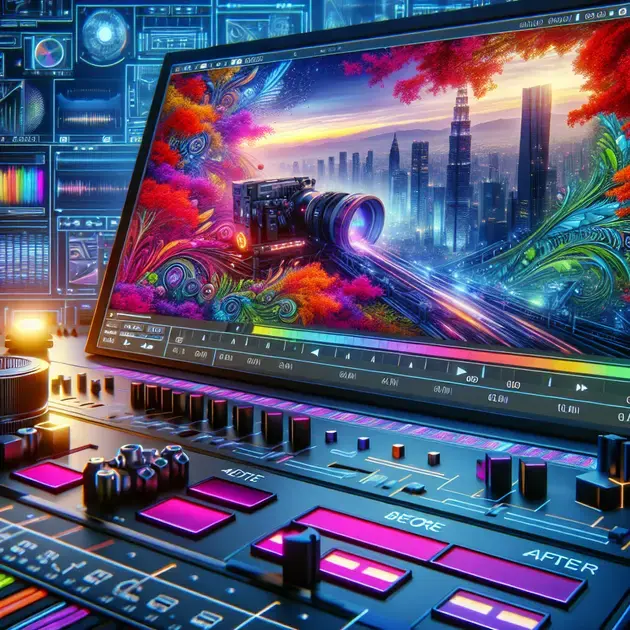Transforming YouTube Videos into High-Quality Videos has become a hot topic in the world of content creation. With the increasing demand for top-notch video production, many creators are looking for ways to enhance the quality of their YouTube content.
One of the key factors to consider when transforming YouTube videos into high-quality videos is the importance of video resolution. In today’s digital age, viewers are more drawn to videos that are crystal clear and visually appealing. Therefore, understanding how to optimize resolution can significantly impact the overall quality of your content.

Enhancing Video Quality Through Resolution Optimization
Improving video quality through resolution optimization is essential for creating high-quality content. By ensuring that your videos have the right resolution, you can enhance the viewing experience for your audience. Here are some tips to help you achieve this:
1. Choose the Right Resolution
Before uploading your video, make sure to choose the right resolution. Most platforms, like YouTube, recommend using resolutions like 1080p or 4K for better quality. You can adjust the resolution settings in video editing software like Adobe Premiere Pro or Final Cut Pro.
2. Use Video Enhancing Tools
There are various video enhancing tools available that can help improve the quality of your videos through resolution optimization. Apps like Video Enhancer and Movavi Video Editor offer features to upscale video resolution and enhance overall quality.
3. Avoid Over-Compression
When compressing your videos for online distribution, make sure to avoid over-compression, as this can lead to a loss in video quality. Use optimal compression settings in software like HandBrake or VLC Media Player to maintain resolution while reducing file size.
4. Update Camera Settings
If you’re recording new videos, ensure that your camera settings are optimized for capturing high-resolution footage. Adjust settings like bitrate, frame rate, and resolution in your camera settings to achieve the best video quality possible.
5. Test Different Resolutions
Experiment with different resolutions to see which one works best for your content. Some videos may look better in lower resolutions, while others may benefit from higher resolutions. Test various resolutions and gather feedback to determine the optimum resolution for your videos.
5 Tips for Transforming YouTube Videos into High-Quality Content
Transforming YouTube videos into high-quality content involves various strategies to enhance the overall viewing experience for your audience. Here are five tips to help you achieve this:
1. Use High-Quality Thumbnails
Creating eye-catching thumbnails with high resolution can attract more viewers to your YouTube videos. Tools like Canva or Adobe Spark offer templates and editing features to design visually appealing thumbnails for your content.
2. Optimize Video Titles and Descriptions
Optimizing your video titles and descriptions with relevant keywords can improve visibility and engagement. Use SEO tools like TubeBuddy or VidIQ to research keywords and optimize your video metadata for better search rankings.
3. Incorporate High-Quality Audio
High-quality audio is crucial for enhancing the overall video quality. Invest in a good microphone and audio editing software like Audacity to ensure clear and crisp audio in your YouTube videos.
4. Edit Videos Professionally
Professional video editing can significantly improve the quality of your content. Software like Adobe Premiere Pro or DaVinci Resolve offers advanced editing features to enhance visuals, transitions, and overall production value of your videos.
5. Engage with Your Audience
Building a community around your YouTube channel can boost engagement and loyalty. Respond to comments, ask for feedback, and create interactive content to foster a connection with your audience and transform your videos into high-quality content.
The Impact of Video Resolution on Content Quality
The resolution of a video plays a significant role in determining the overall quality of the content. Understanding the impact of video resolution is crucial for creating engaging and visually appealing videos. Here’s how resolution can affect content quality:
1. Clarity and Sharpness
Higher resolutions, such as 4K, offer superior clarity and sharpness compared to lower resolutions. Viewers can enjoy crisp images and details, enhancing the overall viewing experience. Adjusting the resolution can significantly impact the clarity of your content.
2. Viewing Experience
The resolution directly affects the viewing experience of your audience. Higher resolutions provide a more immersive and enjoyable viewing experience, while lower resolutions can result in pixelation and reduced quality. Choose the right resolution based on the content and audience preferences.
3. Compatibility with Devices
Different devices have varying display capabilities, which can impact how the video resolution is perceived. Ensure that your videos are optimized for different devices and screen sizes to maintain quality across platforms. Test your videos on multiple devices to ensure compatibility.
4. Brand Image
The quality of your videos reflects on your brand image. High-resolution videos convey professionalism and attention to detail, while low-resolution videos may give a poor impression. By optimizing video resolution, you can enhance your brand image and credibility among viewers.
5. Streaming Quality
Streaming platforms like YouTube and Netflix prioritize high-resolution content for better streaming quality. By optimizing the resolution of your videos, you can ensure smoother playback, reduced buffering, and improved overall streaming experience for your audience.

**Improving Video Clarity with Advanced Editing Techniques**
Introduction
Enhancing video clarity is crucial in delivering high-quality content that captures and holds the audience’s attention. By utilizing advanced editing techniques, videographers can elevate the visual appeal of their videos and create a more immersive viewing experience. In this guide, we will explore various editing methods that can help improve video clarity and overall production quality.
Utilizing High-Resolution Footage
One of the key factors in improving video clarity is to start with high-resolution footage. Investing in cameras and equipment that can capture crisp and clear images is essential for achieving a professional-looking final product. By using high-resolution footage, videographers can maintain clarity and sharpness even after editing and exporting the video.
Additionally, shooting in a higher resolution allows for more flexibility during the editing process. Videographers can crop, zoom, and adjust the framing of the footage without compromising clarity. This flexibility is particularly useful when creating different aspect ratios for various platforms.
Enhancing Sharpness and Detail
Advanced editing tools offer various options for enhancing sharpness and detail in videos. Techniques such as sharpening, clarity adjustments, and noise reduction can significantly improve the overall clarity of the footage. By carefully adjusting these settings, videographers can make details pop and create a more refined visual experience for viewers.
It’s important to strike a balance when applying these enhancements to avoid over-sharpening or introducing artifacts. Testing different settings and viewing the video on multiple screens can help ensure that the final result maintains clarity across different viewing platforms.
Color Grading for Clarity
Color grading plays a significant role in enhancing video clarity by defining the overall look and feel of the footage. By using color correction tools effectively, videographers can improve the contrast, brightness, and color accuracy of their videos. Adjusting the color temperature, tint, and saturation can help create a more vibrant and visually appealing final product.
Moreover, color grading can help differentiate between elements in the frame, improving overall clarity and visual hierarchy. By ensuring that each element stands out and contributes to the narrative, videographers can guide the viewer’s attention and create a more engaging viewing experience.
Final Thoughts
By implementing advanced editing techniques, videographers can significantly improve the clarity and visual appeal of their videos. Starting with high-resolution footage, enhancing sharpness and detail, and utilizing color grading effectively are essential steps in the video production process. By paying attention to these aspects and continually refining their editing skills, videographers can create compelling content that stands out in today’s competitive digital landscape.
Conclusion
Improving video clarity through advanced editing techniques is essential for creating engaging and professional-looking content. Starting with high-resolution footage sets the foundation for a clear and sharp final product, allowing videographers to have flexibility in editing while maintaining clarity across various platforms.
Enhancing sharpness and detail using advanced editing tools such as sharpening and noise reduction can elevate the visual experience for viewers, emphasizing important details without compromising the overall clarity. By carefully balancing these enhancements, videographers can ensure a visually refined output that resonates with the audience.
Color grading is a powerful tool in enhancing video clarity, offering the opportunity to adjust contrast, brightness, and color accuracy. Through effective color correction, videographers can create a vibrant and visually appealing video that guides the viewer’s attention and enhances the overall visual hierarchy, resulting in a more immersive viewing experience.